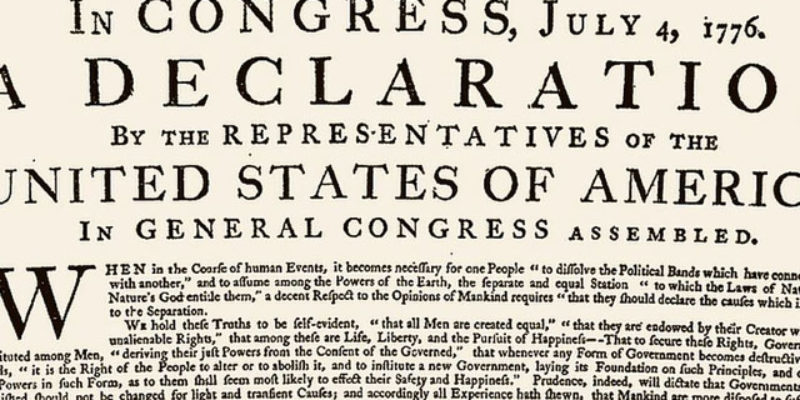July 4th, 1776. The Declaration of Independence. It has been noted many times that the Declaration is the “promise” of America and the U.S. Constitution, the “fulfillment” of the promise of America.
In the Declaration, with those eternal, elegantly written words, Thomas Jefferson firmly declared the separation of the thirteen existing states of the United States from Great Britain—due to the “long train of abuses and usurpations” which Jefferson carefully and eloquently outlined that King George III had inflicted on the new American states. This was, of course, the official legal and diplomatic pronouncement to the King, Great Britain, and the world that the United States was formally and politically separating from Great Britain.
Jefferson then laid down an indelible principle for our country and the world: The statement of the “truths” that “all men are created equal” and that they are also “endowed by their Creator with certain unalienable Rights” including “Life, Liberty and the pursuit of Happiness.”
It is difficult to express how remarkable this idea was; a principle as profound as it is inspiring: the ideal—for which we as a nation will always strive—being government by consent of the governed which realizes that God, not government, is the source of all human rights and that what government does not give, government cannot take away.
Following faithfully the “promise” of the Declaration, the U.S. Constitution established a government charged with the sacred duty to ensure the inherent equality of all citizens regardless of race, gender, or socio-economic background.
Advertisement
And yes, America continues to be a work in progress as we strive to fully implement this fundamental principle grounded into the DNA of the Nation’s founding document: a nation in which, as Dr. Martin Luther King, Jr. would later expound, Americans are judged “based on the content of their character, not the color of their skin.” This principle of equality was and remains unprecedented in the history of the governments of nations.
I can do no better than to conclude with the final words of this magnificent document itself, which clearly reflect that the signers realized the grave danger to which they were exposing themselves by signing the Declaration, an act the British would no doubt view as treasonous:
“And for the support of this Declaration, with a firm Reliance on the Protection of divine Providence, we mutually pledge to each other our Lives, our Fortunes, and our sacred Honor.” (One of my favorite historical anecdotes is one involving one of the signers, John Hancock, who signed his name to the Declaration in a bold and conspicuously large way so that, he said, “the King could read my signature without his spectacles!”).
Have a happy and independent 4th of July! May God bless our great country.
Advertisement
Advertisement

